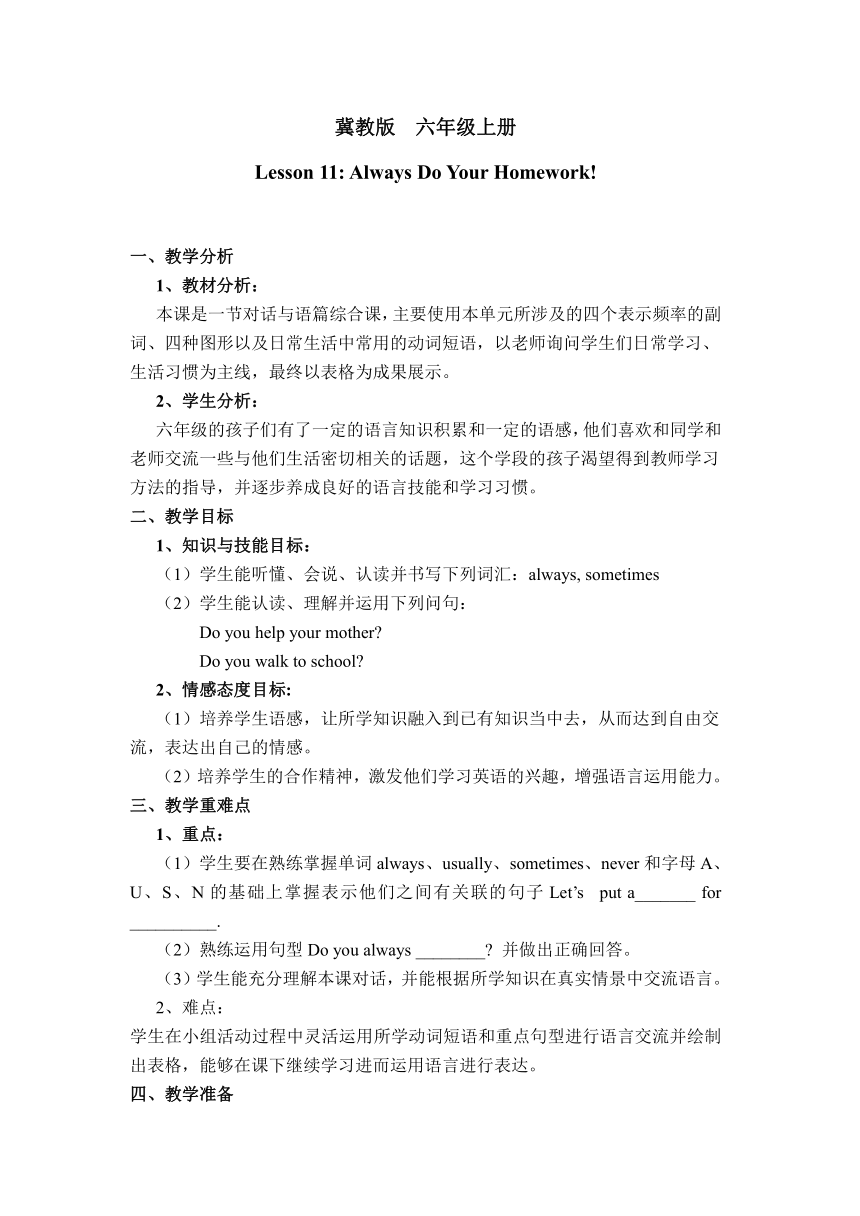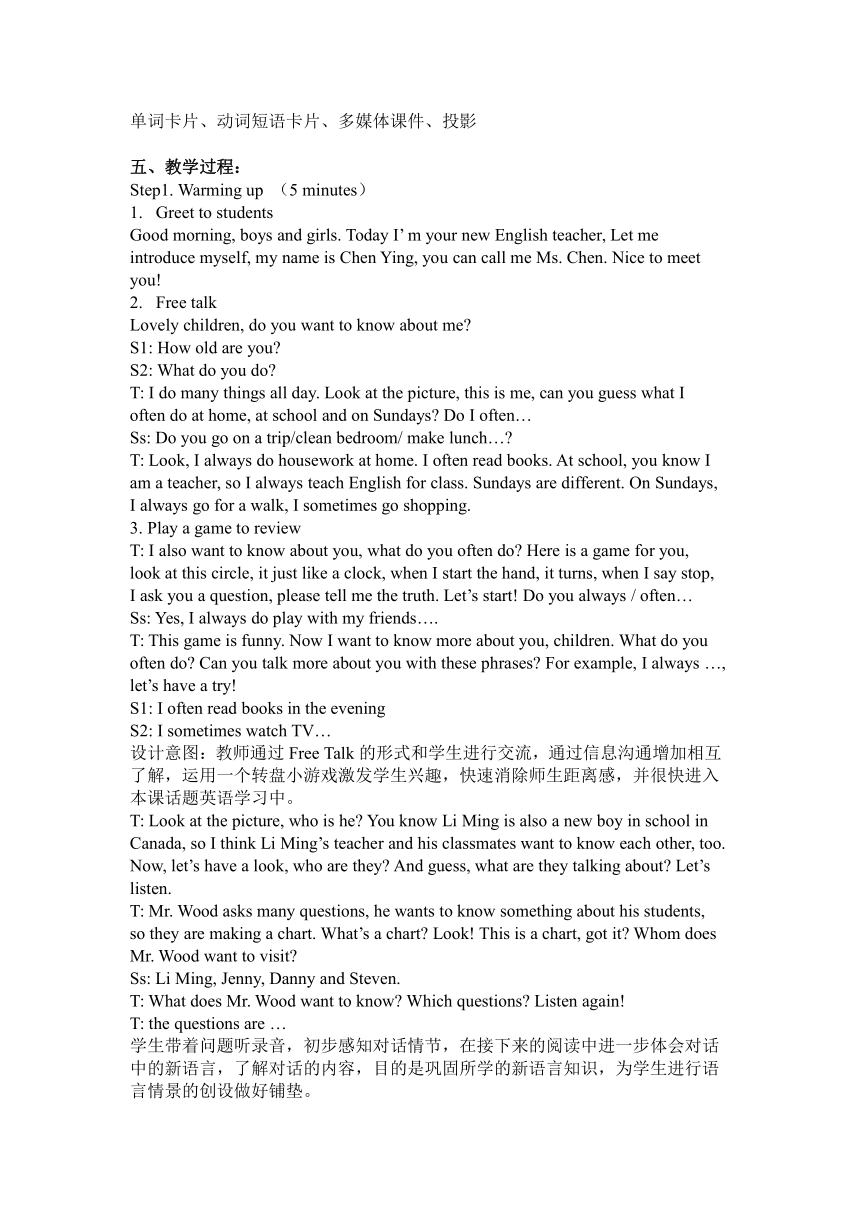Unit 2 Lesson 11 Always do your homework!教案
文档属性
| 名称 | Unit 2 Lesson 11 Always do your homework!教案 |  | |
| 格式 | doc | ||
| 文件大小 | 40.0KB | ||
| 资源类型 | 教案 | ||
| 版本资源 | 冀教版(三年级起点) | ||
| 科目 | 英语 | ||
| 更新时间 | 2020-12-19 15:59:32 | ||
图片预览


文档简介
冀教版 六年级上册
Lesson 11: Always Do Your Homework!
一、教学分析
1、教材分析:
本课是一节对话与语篇综合课,主要使用本单元所涉及的四个表示频率的副词、四种图形以及日常生活中常用的动词短语,以老师询问学生们日常学习、生活习惯为主线,最终以表格为成果展示。
2、学生分析:
六年级的孩子们有了一定的语言知识积累和一定的语感,他们喜欢和同学和老师交流一些与他们生活密切相关的话题,这个学段的孩子渴望得到教师学习方法的指导,并逐步养成良好的语言技能和学习习惯。
二、教学目标
1、知识与技能目标:
(1)学生能听懂、会说、认读并书写下列词汇:always, sometimes
(2)学生能认读、理解并运用下列问句:
Do you help your mother?
Do you walk to school?
2、情感态度目标:
(1)培养学生语感,让所学知识融入到已有知识当中去,从而达到自由交流,表达出自己的情感。
(2)培养学生的合作精神,激发他们学习英语的兴趣,增强语言运用能力。
三、教学重难点
1、重点:
(1)学生要在熟练掌握单词always、usually、sometimes、never和字母A、U、S、N的基础上掌握表示他们之间有关联的句子Let’s? put a_______ for __________.
(2)熟练运用句型Do you always ________? 并做出正确回答。
(3)学生能充分理解本课对话,并能根据所学知识在真实情景中交流语言。
2、难点:
学生在小组活动过程中灵活运用所学动词短语和重点句型进行语言交流并绘制出表格,能够在课下继续学习进而运用语言进行表达。
四、教学准备
单词卡片、动词短语卡片、多媒体课件、投影
五、教学过程:
Step1. Warming up (5 minutes)
Greet to students
Good morning, boys and girls. Today I’ m your new English teacher, Let me introduce myself, my name is Chen Ying, you can call me Ms. Chen. Nice to meet you!
Free talk
Lovely children, do you want to know about me?
S1: How old are you?
S2: What do you do?
T: I do many things all day. Look at the picture, this is me, can you guess what I often do at home, at school and on Sundays? Do I often
Ss: Do you go on a trip/clean bedroom/ make lunch?
T: Look, I always do housework at home. I often read books. At school, you know I am a teacher, so I always teach English for class. Sundays are different. On Sundays, I always go for a walk, I sometimes go shopping.
3. Play a game to review
T: I also want to know about you, what do you often do? Here is a game for you, look at this circle, it just like a clock, when I start the hand, it turns, when I say stop, I ask you a question, please tell me the truth. Let抯 start! Do you always / often
Ss: Yes, I always do play with my friends.
T: This game is funny. Now I want to know more about you, children. What do you often do? Can you talk more about you with these phrases? For example, I always , let抯 have a try!
S1: I often read books in the evening
S2: I sometimes watch TV…
设计意图:教师通过Free Talk的形式和学生进行交流,通过信息沟通增加相互了解,运用一个转盘小游戏激发学生兴趣,快速消除师生距离感,并很快进入本课话题英语学习中。
T: Look at the picture, who is he? You know Li Ming is also a new boy in school in Canada, so I think Li Ming抯 teacher and his classmates want to know each other, too. Now, let抯 have a look, who are they? And guess, what are they talking about? Let抯 listen.
T: Mr. Wood asks many questions, he wants to know something about his students, so they are making a chart. What抯 a chart? Look! This is a chart, got it? Whom does Mr. Wood want to visit?
Ss: Li Ming, Jenny, Danny and Steven.
T: What does Mr. Wood want to know? Which questions? Listen again!
T: the questions are
学生带着问题听录音,初步感知对话情节,在接下来的阅读中进一步体会对话中的新语言,了解对话的内容,目的是巩固所学的新语言知识,为学生进行语言情景的创设做好铺垫。
This time, let’s listen part 1 and finish the chart. For example, does Li Ming do his homework? Li Ming says…
Ss: Yes, always.
T: Let’s put an A for always, I write down a letter A in the chart, that means Li Ming always does his homework. We also put an O for often, put an S for sometimes, and put an S for卬ever.
Now, pens ready! Listen, finish the chart and answer my questions.
T: Have you finished the chart? Let抯 check it together. Look at the chart:
Q1.Does Li Ming always does his homework? Yes, we know, he always does his homework, so how do you think about him? Do you think he is a good student? How about you? Do you always do your homework?
Look at the sentences, pay attention to the intonation, and try to read correctly.
Q2. Does Jenny always help her mother? Look, she says匴hy does she often help her mother?
S1. She is a good girl.
T: you know, mothers always do lots of work a day, they make meals for us, wash clothes for us, they do many things for us, so children, do you help your mother?
S1: I often help my mother.
S2: I always help my mother.
Q3. Does Steven always walk to school?
S1: No, sometimes, let抯 read the sentences. Sometimes, he rides his bike. So we know, he live near or far from school?
Ss: He lives near the school.
Q4. Does Danny wear dresses?
Ss: No, Never.
T: Why?
Ss: They are boys!
T: So, when we read the sentences, try to read emotionally and correctly!
Open your books, try to read the part 1, and also you can read in role.
朗读课文,学生分角色扮演文本人物,初步形成对文本的语感。通过课本剧表演,进一步巩固所学知识,熟悉伍德老师的语言,为下一步拓展练习打下坚实的语言基础。
Pair works:
Just now, we have made the chart from Mr. Wood, pairs, please ask your partner about these questions, and finish the last line in the chart, ok?
以Mr. Wood所提问题进行问答,小组内轮流提问和回答,完成后进行交流并展示。学生在小组合作学习中将互相帮助互相学习,这样他们的学习任务会完成的更轻松、更有效。
Practice:
Look, here is another chart from students, read the chart and write down the correct words in the blanks. 完成本课第二项Let’s do it 里面的Look and write。
Let’s check the answers, who wants to have a try?
Step 4. Consolidation.
T: Look, CCTV Dafengche program wants to make a survey about good habits in teenagers, Can you help them to make the chart? This time, let抯 make a chart by ourselves, what do you do on daily life? Visit your friends in your groups, ask and answer, try to finish the chart with these phrases you know, Can you write down your questions as more as you can? let抯 begin!
采用“任务型”的教学模式,给学生布置任务,并给他们以自由发挥的空间,使其达到用英语表达交流,能够努力实践并展示自己。学生在活动中互助互爱,共同学习,有助于形成团结协作的好习惯。学生在学中玩,玩中学,体会英语学习的乐趣。
Homework:
每人制作一份chart,采访的人数和内容越多越好。
通过这个作业学生自主学习,自主发展的能力可以延伸到课外,使所学知识内化为语言技能;同时,要求每人制作一份chart,还可以让学生用自己喜欢的动词短语来采访不同的人,他们会在课下查资料,从而达到拓展延伸的目的。
Lesson 11: Always Do Your Homework!
一、教学分析
1、教材分析:
本课是一节对话与语篇综合课,主要使用本单元所涉及的四个表示频率的副词、四种图形以及日常生活中常用的动词短语,以老师询问学生们日常学习、生活习惯为主线,最终以表格为成果展示。
2、学生分析:
六年级的孩子们有了一定的语言知识积累和一定的语感,他们喜欢和同学和老师交流一些与他们生活密切相关的话题,这个学段的孩子渴望得到教师学习方法的指导,并逐步养成良好的语言技能和学习习惯。
二、教学目标
1、知识与技能目标:
(1)学生能听懂、会说、认读并书写下列词汇:always, sometimes
(2)学生能认读、理解并运用下列问句:
Do you help your mother?
Do you walk to school?
2、情感态度目标:
(1)培养学生语感,让所学知识融入到已有知识当中去,从而达到自由交流,表达出自己的情感。
(2)培养学生的合作精神,激发他们学习英语的兴趣,增强语言运用能力。
三、教学重难点
1、重点:
(1)学生要在熟练掌握单词always、usually、sometimes、never和字母A、U、S、N的基础上掌握表示他们之间有关联的句子Let’s? put a_______ for __________.
(2)熟练运用句型Do you always ________? 并做出正确回答。
(3)学生能充分理解本课对话,并能根据所学知识在真实情景中交流语言。
2、难点:
学生在小组活动过程中灵活运用所学动词短语和重点句型进行语言交流并绘制出表格,能够在课下继续学习进而运用语言进行表达。
四、教学准备
单词卡片、动词短语卡片、多媒体课件、投影
五、教学过程:
Step1. Warming up (5 minutes)
Greet to students
Good morning, boys and girls. Today I’ m your new English teacher, Let me introduce myself, my name is Chen Ying, you can call me Ms. Chen. Nice to meet you!
Free talk
Lovely children, do you want to know about me?
S1: How old are you?
S2: What do you do?
T: I do many things all day. Look at the picture, this is me, can you guess what I often do at home, at school and on Sundays? Do I often
Ss: Do you go on a trip/clean bedroom/ make lunch?
T: Look, I always do housework at home. I often read books. At school, you know I am a teacher, so I always teach English for class. Sundays are different. On Sundays, I always go for a walk, I sometimes go shopping.
3. Play a game to review
T: I also want to know about you, what do you often do? Here is a game for you, look at this circle, it just like a clock, when I start the hand, it turns, when I say stop, I ask you a question, please tell me the truth. Let抯 start! Do you always / often
Ss: Yes, I always do play with my friends.
T: This game is funny. Now I want to know more about you, children. What do you often do? Can you talk more about you with these phrases? For example, I always , let抯 have a try!
S1: I often read books in the evening
S2: I sometimes watch TV…
设计意图:教师通过Free Talk的形式和学生进行交流,通过信息沟通增加相互了解,运用一个转盘小游戏激发学生兴趣,快速消除师生距离感,并很快进入本课话题英语学习中。
T: Look at the picture, who is he? You know Li Ming is also a new boy in school in Canada, so I think Li Ming抯 teacher and his classmates want to know each other, too. Now, let抯 have a look, who are they? And guess, what are they talking about? Let抯 listen.
T: Mr. Wood asks many questions, he wants to know something about his students, so they are making a chart. What抯 a chart? Look! This is a chart, got it? Whom does Mr. Wood want to visit?
Ss: Li Ming, Jenny, Danny and Steven.
T: What does Mr. Wood want to know? Which questions? Listen again!
T: the questions are
学生带着问题听录音,初步感知对话情节,在接下来的阅读中进一步体会对话中的新语言,了解对话的内容,目的是巩固所学的新语言知识,为学生进行语言情景的创设做好铺垫。
This time, let’s listen part 1 and finish the chart. For example, does Li Ming do his homework? Li Ming says…
Ss: Yes, always.
T: Let’s put an A for always, I write down a letter A in the chart, that means Li Ming always does his homework. We also put an O for often, put an S for sometimes, and put an S for卬ever.
Now, pens ready! Listen, finish the chart and answer my questions.
T: Have you finished the chart? Let抯 check it together. Look at the chart:
Q1.Does Li Ming always does his homework? Yes, we know, he always does his homework, so how do you think about him? Do you think he is a good student? How about you? Do you always do your homework?
Look at the sentences, pay attention to the intonation, and try to read correctly.
Q2. Does Jenny always help her mother? Look, she says匴hy does she often help her mother?
S1. She is a good girl.
T: you know, mothers always do lots of work a day, they make meals for us, wash clothes for us, they do many things for us, so children, do you help your mother?
S1: I often help my mother.
S2: I always help my mother.
Q3. Does Steven always walk to school?
S1: No, sometimes, let抯 read the sentences. Sometimes, he rides his bike. So we know, he live near or far from school?
Ss: He lives near the school.
Q4. Does Danny wear dresses?
Ss: No, Never.
T: Why?
Ss: They are boys!
T: So, when we read the sentences, try to read emotionally and correctly!
Open your books, try to read the part 1, and also you can read in role.
朗读课文,学生分角色扮演文本人物,初步形成对文本的语感。通过课本剧表演,进一步巩固所学知识,熟悉伍德老师的语言,为下一步拓展练习打下坚实的语言基础。
Pair works:
Just now, we have made the chart from Mr. Wood, pairs, please ask your partner about these questions, and finish the last line in the chart, ok?
以Mr. Wood所提问题进行问答,小组内轮流提问和回答,完成后进行交流并展示。学生在小组合作学习中将互相帮助互相学习,这样他们的学习任务会完成的更轻松、更有效。
Practice:
Look, here is another chart from students, read the chart and write down the correct words in the blanks. 完成本课第二项Let’s do it 里面的Look and write。
Let’s check the answers, who wants to have a try?
Step 4. Consolidation.
T: Look, CCTV Dafengche program wants to make a survey about good habits in teenagers, Can you help them to make the chart? This time, let抯 make a chart by ourselves, what do you do on daily life? Visit your friends in your groups, ask and answer, try to finish the chart with these phrases you know, Can you write down your questions as more as you can? let抯 begin!
采用“任务型”的教学模式,给学生布置任务,并给他们以自由发挥的空间,使其达到用英语表达交流,能够努力实践并展示自己。学生在活动中互助互爱,共同学习,有助于形成团结协作的好习惯。学生在学中玩,玩中学,体会英语学习的乐趣。
Homework:
每人制作一份chart,采访的人数和内容越多越好。
通过这个作业学生自主学习,自主发展的能力可以延伸到课外,使所学知识内化为语言技能;同时,要求每人制作一份chart,还可以让学生用自己喜欢的动词短语来采访不同的人,他们会在课下查资料,从而达到拓展延伸的目的。
同课章节目录
- Unit 1 Li Ming Goes to Canada
- Lesson 1 At the Airport
- Lesson 2 Jenny's House
- Lesson 3 Making Breakfast
- Lesson 4 Making Dinne
- Lesson 5 In the Living Room
- Lesson 6 Baby Becky at Home
- Unit 2 School in Canada
- Lesson 7 On the School Bus
- Lesson 8 Li Ming Meets Jenny's class
- Lesson 9 Mr. Wood Teaches a Lesson
- Lesson 10 How Many Are There ?
- Lesson 11 Always do your homework!
- Lesson 12 Be Safe on the Way
- Unit 3 Winter in canada
- Lesson 13 Seasons
- Lesson 14 Snow! It's Winter!
- Lesson 15 Winter Fun
- Lesson 16 A Skating Lesson
- Lesson 17 I Like All Seasons!
- Lesson 18 The Snowman
- Unit 4 Christmas
- Lesson 19 Christmas Is Coming!
- Lesson 20 Oh,Christmas Tree
- Lesson 21 Christmas Cards
- Lesson 22 Christmas Gifts
- Lesson 23 It's Christmas Morning!
- Lesson 24 Maddy's Christmas
